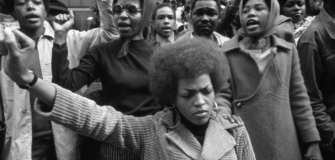ESSENCE: Expanding Our Frame: Deepening Our Demands For Safety And Healing For Black Survivors of Sexual Violence
Share
Read THE article in its entirety at Essence.com…
By Andrea J. Ritchie | February 28, 2019
me, too.
Two words uttered in conversations between a Black woman named Tarana Burke and a group of Black girls in an Alabama afterschool program.
Two words that went viral a decade later.
Two words that represent a rallying cry for healing and accountability for survivors.
Yet, unfortunately, mainstream conversations and calls for action sparked by #MeToo have largely left the Black girls in Alabama and across the country behind. With a few notable exceptions in recent months – Dr. Vanessa Tyson, the Black girls who courageously came forward in dream hampton’s Surviving R. Kelly, and Cyntoia Brown – the narrative underlying the viral version of #MeToo has excluded Black women, girls, trans and nonbinary people.
Sexual violence against Black women, girls, and gender nonconforming people has long been a part of this country’s historical narrative, facilitating the maintenance and expansion of the institution of slavery and representing a continuing vestige of inequality and oppression – a reality that bears repeating this and every Black History Month. For most of U.S. history, the rape and sexual assault of Black women and girls were not punishable by law. Since then, the myths conjured and widely disseminated to justify systematic rape during and beyond slavery have presented Black women and girls as promiscuous, sexually deviant, and ultimately inviolable. These tropes shape how society understands and responds to sexual violence against Black women, girls, trans and gender nonconforming people to this day.
According to a new report by the National Black Women’s Justice Institute released at the Power Rising conference titled Expanding Our Frame, Deepening our Demands for Safety and Healing for Black Survivors of Sexual Violence, Black girls, women, and trans and gender nonconforming people experience the second highest rates of sexual violence any demographic group after Indigenous women. And for Black women, girls, trans and gender nonconforming people, many institutions framed as solutions to sexual violence and spaces of safety and healing – including police, schools, health care providers, social services – can also be sources and sites of further sexual violence. Yet many of their experiences are rendered invisible by a narrow focus on sexual violence in the entertainment industry, politics, and high end corporate workplaces.
Like the first 13-year-old girl Burke recalls talking to in Alabama, Black women, girls, and gender nonconforming people experience sexual violence at home, often at the hands of a family member or caregiver. Or at school, where 15% of Black transgender respondents to a national survey and 11% of Black girls in a national high school sample reported being sexually assaulted. Or in foster care – where Black youth are disproportionately represented and studies have found that 30-50% of reported cases of abuse in the system involve sexual violence. Or, like actor Tiffany Haddish, or the 13 Black women and girls who described sexual assaults by former Oklahoma City Police Officer Daniel Holtzclaw, the person who sexually assaulted them may have been a law enforcement officer, whether in a police-community engagement program, an officer stationed at their school, a beat officer in their neighborhood, an ICE agentor Border Patrol, or an officer responding to a call for help. Or they might experience sexual assault in jail or while on probation or parole. Doctor’s offices, state hospitals, and social service agencies are also sites of sexual violence, particularly for disabled Black women, girls, trans and gender nonconforming people.
The lack of attention to these experiences in current conversations has consequences for where we seek solutions and direct resources, services, healing and accountability.
For example, while advocates recently joined forces with New York Governor Andrew Cuomo to advance legislation addressing sexual assault in the workplace, there has been less support for Black women’s calls on Cuomo to offer relief to currently incarcerated survivors of sexual violencewho have been criminalized and are currently incarcerated for actions connected to the violence they experienced.
Similarly, many state and federal legislators are relying exclusively on criminal prosecutions to respond to sexual violence by law enforcement, leaving out prevention measures and alternate avenues of accountability and healing. For many survivors, the criminal legal system not a viable option. For instance, narratives about Black women, girls, trans and nonbinary people frame us as less credible victims of sexual assault, and there is often no “evidence” beyond a survivor’s word. Survivors may not even come forward for fear of being criminalized or subject to immigration enforcement, or of the repercussions of accusing a law enforcement officer, social worker, or probation officer of sexual violence.
In June 2018, Burke and Girls for Gender Equity founder Joanne Smith issued a call to “reframe and expand the global conversation around sexual violence to speak to the needs of a broader spectrum of survivors including young people, queer, trans, and disabled folks, Black women and girls, and all communities of color.” Expanding the Frame uplifts new structures of prevention and accountability and offers recommendations to address these needs. For example, we must confront persistent perceptions of Black women, girls, trans and gender nonbinary people as unbelievable and unworthy victims, and our collective failure to believe them when they come forward. We must end sexual violence by law enforcement, penal officials, probation and parole officers. We must remove police officers from schools and create mechanisms for students, parents, teachers, and counselors to co-create transformative approaches to school safety.
Expanding the Frame gives us the tools to do just that, pointing us to inclusive messaging, policy recommendations, and the work of organizations like Black Women’s Blueprint, BYP100, Trans Sistas of Color Project, Girls for Gender Equity, Women with a Vision and EveryBlackGirlwho are are advancing robust community-based, network-oriented, and healing-informed responses. Expanding the frame of #MeToo is essential to building an inclusive, global, and sustainable anti -sexual violence movement, and to ensuring that no survivors of sexual violence, especially Black women, girls, trans and gender nonbinary people, are left behind.
Andrea J. Ritchie is a Black lesbian immigrant feminist and survivor who has been engaged in research, organizing and advocacy focuses on profiling, policing and criminalization of Black women, girls, and LGBTQ people for over two decades.
Monique W. Morris, Ed.D. is Founder and President of the National Black Women’s Justice Institute. She is the author of PUSHOUT: The Criminalization of Black Girls in Schools (The New Press, 2016) and the forthcoming Sing A Rhythm, Dance A Blues: Education for the Liberation of Black and Brown Girls (The New Press, 2019).




Follow Us